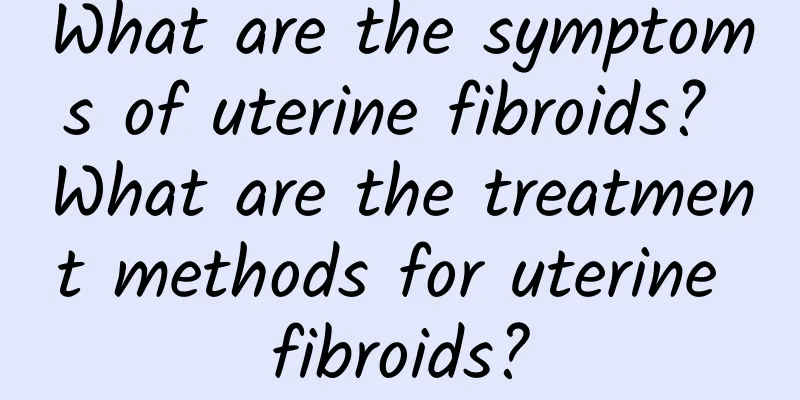What are the symptoms of uterine fibroids? What are the treatment methods for uterine fibroids?

|
Uterine fibroids are a common gynecological tumor disease, which can be divided into benign and malignant. Symptoms of uterine fibroids include uterine bleeding, increased leucorrhea, enlarged uterine cavity, anemia, etc. According to experts, uterine fibroids cannot be effectively prevented, so how should they be treated? Reasonable diet, happy mood, mothers who let nature take its course, harmony, etc. are all good ways to deal with them. Uterine fibroids are one of the most common benign tumors in the female reproductive organs and one of the most common tumors in the human body. They are also called fibroids and uterine fibroids. Because uterine fibroids are mainly composed of the proliferation of uterine smooth muscle cells and a small amount of fibrous connective tissue exists as supporting tissue, they are more accurately called uterine leiomyoma. Uterine fibroids. 7 Symptoms of Uterine Fibroids: 1. Uterine bleeding is the main symptom of uterine fibroids, which occurs in more than half of patients. Among them, cyclical bleeding is mostly increased menstrual volume, prolonged menstrual period or shortened cycle. It can also manifest as irregular vaginal bleeding during menstrual cycle. Uterine bleeding is common in submucosal fibroids and intramural fibroids, while subserosal fibroids rarely cause uterine bleeding. 2. Abdominal masses and compression symptoms Myomas grow gradually. When the uterus enlarges for more than 3 months, when it is the size of a pregnant uterus or a large subserosal myoma located at the bottom of the uterus, the abdominal mass can usually be felt, and it is more obvious in the morning when the bladder is full. The mass is substantial, movable, and not tender. When myomas grow to a certain size, they can cause compression symptoms on surrounding organs. People with fibroids on the anterior wall of the uterus close to the bladder may experience frequent urination and urgency; huge cervical myomas compressing the bladder can cause poor urination or even urinary retention; fibroids on the posterior wall of the uterus, especially canyon or posterior lip of the cervix, can compress the rectum, causing poor defecation and discomfort after defecation; huge broad ligament myomas can compress the ureter and even cause hydronephrosis 3. Pain Generally speaking, uterine fibroids do not cause pain, but many patients may complain of lower abdominal swelling and back pain. When the pedicle of the subserosal fibroids is twisted or the uterine fibroids undergo red degeneration, acute abdominal pain will occur. It is not uncommon for fibroids to be combined with endometriosis or adenomyosis, and there may be dysmenorrhea. 4. Increased leucorrhea. Increased endometrial glands in the uterine cavity, coupled with pelvic congestion, can increase leucorrhea. When the uterus or cervical submucosal fibroids ulcerate, become infected, or necrotic, bloody or purulent leucorrhea will occur. 5. Infertility and miscarriage Some patients with uterine fibroids are accompanied by infertility or prone to miscarriage. The impact on pregnancy and pregnancy outcomes may be related to the location, size and number of fibroids. Huge uterine fibroids can cause uterine deformation, hindering the implantation of the gestational sac and the growth and development of the embryo; fibroids compressing the fallopian tubes can cause the lumen to be rough; submucosal fibroids can hinder the implantation of the gestational sac or affect the entry of sperm into the uterine cavity. The spontaneous abortion rate of patients with fibroids is higher than that of normal people, about 4:1. 6. Anemia: Long-term menorrhagia or irregular vaginal bleeding can lead to hemorrhagic anemia. More severe anemia is more common in patients with submucosal fibroids. 7 A very small number of patients with uterine fibroids may develop polycythemia and hypoglycemia, which is generally believed to be related to the production of ectopic hormones by the tumor. What should I do if I find uterine fibroids after pregnancy? To prevent uterine fibroids, avoid unsafe abortion, arrange diet properly, women should eat more foods rich in protein and vitamins. Go to the hospital for gynecological examination regularly. Can uterine fibroids be prevented? The cause of uterine fibroids is unclear and cannot be effectively prevented, but they can be found by ultrasound during physical examinations. If there are no symptoms, you can continue to observe; if the tumor is relatively large or has affected the body, you can choose surgical treatment. It is done under laparoscopy and the trauma is relatively small; for women of childbearing age, the uterus can also be preserved without affecting fertility. 5 tips for dealing with uterine fibroids: 1. Eat a healthy diet At present, medicine believes that uterine fibroids (gynecological oncology) are closely related to high estrogen levels. Therefore, women should eat more foods rich in protein and vitamins. Foods with high heat, blood coagulation, and hormone content, such as longan, red dates, donkey-hide gelatin, and royal jelly, should be reasonably selected and avoided in excess. 2. Pleasant emotions Happiness is a very important thing. Women who are overstressed, often nervous, and depressed tend to increase estrogen secretion and enhance the effect, sometimes lasting for several months or even years, which is also an important cause of uterine fibroids. 3. Contraception The method of abortion (obstetrics) surgery is curettage, and the impact and stimulation on the uterus is inevitable. According to research, the frequency of abortion (obstetrics) may cause uterine fibroids. So, when you don't plan to have the next generation, do a good job of contraception. 4. Let Motherhood Take Its Natural Path Pregnancy and childbirth are good ways to regulate hormone levels in the body. Gynecologists often recommend that women get pregnant at the right age. During pregnancy, the uterus is affected by estrogen and progesterone, which is equivalent to a system reorganization. In this way, possible unstable factors such as hormone secretion disorders are regulated normally, reducing the incidence of some hormone-dependent diseases, uterine fibroids being one of them. Studies have shown that if women have a complete pregnancy process in their lives, it can increase immunity for 10 years, mainly against gynecological tumors. Sex, harmony Normal sexual stimulation can promote the normal functioning of the neuroendocrine system and make the body's hormone secretion normal and good. Rarely having sex or sexual intercourse can easily cause hormone secretion disorders, leading to chronic pelvic congestion and inducing uterine fibroids. |
>>: Common symptoms of uterine fibroids Prevention methods of uterine fibroids
Recommend
Regular life can help women prevent ovarian cysts
Ovarian cyst disease is a gynecological disease. ...
Why does cervical erosion last for a long time?
Due to certain factors, the vaginal environment c...
Warning: Two major factors can cause vulvar leukoplakia
According to the latest survey and research, the ...
What medicine is good for women with chronic cervicitis? Teach you how to use medicine to treat chronic cervicitis
Vaginal medication treatment for chronic cervicit...
Pumpkin lowers blood pressure and blood sugar, here are 4 health benefits you must know! Nutritionist: Rich in potassium and vitamin A, diabetics should be careful when eating
When I see pumpkins, I think of Halloween. The an...
The main causes of vulvar leukoplakia that female friends should know
Vulvar leukoplakia is a gynecological disease tha...
Vasopressin and oxytocin may cause primary dysmenorrhea
Dysmenorrhea refers to cramping pain in the lower...
What happens if chocolate cysts are not treated?
Chocolate cysts, also known as ovarian endometrio...
Atractylodes macrocephala, ginger and jujube paste can be used for the dietary treatment of cervical erosion
Patients with cervical erosion can choose appropr...
How much do you know about the symptoms of ectopic pregnancy?
How much do you know about the symptoms of ectopi...
What should patients with cervical hypertrophy pay attention to in all aspects?
What should patients with cervical hypertrophy pa...
What are the symptoms of uterine fibroids? How to treat uterine fibroids
Patients with uterine fibroids do not need to und...
Is pelvic inflammatory disease curable?
Is the cure rate of pelvic inflammatory disease h...
What are the typical symptoms of adnexitis?
What are the typical symptoms of adnexitis? 1. Th...
How to relieve menstrual cramps yourself
Most women experience physical discomfort during ...





![[Video version] What should you eat after vaccination for the best protection?](/upload/images/67dcf9395a27c.webp)



